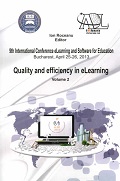MOODLE AS A PLATFORM FOR DISTANCE LEARNING AT THE DEPARTMENT OF MEDIA STUDIES IN NOVI SAD
MOODLE AS A PLATFORM FOR DISTANCE LEARNING AT THE DEPARTMENT OF MEDIA STUDIES IN NOVI SAD
Author(s): Dejan Pralica, Vladimir BarovićSubject(s): Education
Published by: Carol I National Defence University Publishing House
Keywords: moodle; e-learning; media studies; radio journalism
Summary/Abstract: The aim of this paper is to show how the implementation of Moodle program could improve the education at the Department of Media Studies at Faculty of Philosophy in Novi Sad. Since the media studies are interdisciplinary studies, it is easy to adapt them to the new digital technologies. The method of work using this free source e-learning software platform will be thoroughly described in the paper. The case study of the course Radio journalism will try to present many occasions in which Moodle can be used, both in the form of multimedia contents and as an addition to the traditional lectures. The research that will be conducted among the students of the third year (61 subjects), the forth year (54 subjects), and the fifth year (master) (18 subjects) will show the students’ expectations and their abilities during the lectures. The authors assumed that the students of the third, fourth and fifth years have enough knowledge about the digital media, gained during the previous years, thus they were the target group according to which the questionnaire was created. The preliminary results of the research showed that 28% of the participants heard about Moodle and that 66% would be interested in that type of e-learning if the Faculty introduced it. During the pilot phase, the following functions will be used: giving assignments, forum, downloading files, grading, Moodle instant messages, on-line calendar and on-line news and announcements for the course Radio journalism. It is predicted that this type of e-learning would be very interesting and would not represent an obstacle for learning to the generations that were born in the era of digital communication.
Journal: Conference proceedings of »eLearning and Software for Education« (eLSE)
- Issue Year: 9/2013
- Issue No: 02
- Page Range: 374-379
- Page Count: 6
- Language: English

